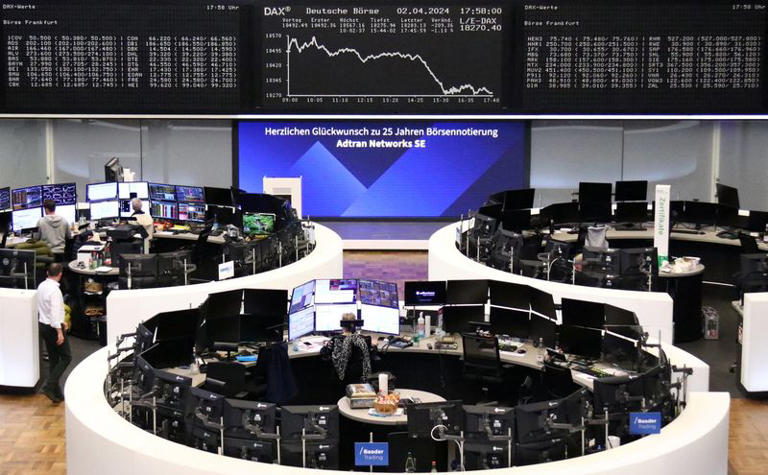On Friday, global shares experienced a decline due to ongoing geopolitical tensions, which resulted in crude oil remaining above $90 a barrel before the release of U.S. payroll numbers. Additionally, concerns arose regarding the pace and timing of interest rate cuts as hawkish central bankers expressed doubts.
The threat of potential disruptions in the oil supply due to prolonged conflicts in the Middle East contributed to Brent oil futures staying above $90 a barrel, reaching a level not seen since October last year, and marking their second consecutive weekly gain.
Following a rebound from a two-week low, the dollar strengthened against other currencies. However, gold’s recent rally to record highs paused ahead of the release of U.S. payroll numbers.
The MSCI All Country stock index declined by 0.3% to 770.7 points during the first week of the quarter after reaching a lifetime high of 785.62 points on March 21. Similarly, Europe’s STOXX index of 600 companies dropped 1.2% to 504.7 points after hitting a lifetime high of 515.77 points on Tuesday.
Comments from Fed Chair Jerome Powell and a cooling U.S. services sector reinforced the expectation of potential rate cuts later this year. Nevertheless, some other Fed officials, notably Minneapolis Fed President Neel Kashkari, adopted a more cautious stance, suggesting that rate cuts may not be necessary if inflation remains subdued.
The markets experienced a pullback amid the uncertainty surrounding the geopolitical tensions and the anticipation of significant U.S. payroll numbers.
U.S. non-farm payroll numbers for March, expected to show a rise of 200,000 compared to February’s 275,000, were awaited eagerly. A print below 200,000 could put pressure on the dollar, signaling a softening employment story and potentially prompting the Fed to start cutting interest rates in the summer.
Despite the previous day’s decline due to hawkish Fed comments and Middle East tension, U.S. stock index futures were trading firmer.
Geopolitical tensions heightened after reports indicated that Israel prepared for possible retaliation following the suspected killing of Iranian generals in Damascus. This led to concerns about escalating conflict in the Middle East.
MSCI’s broadest index of Asia-Pacific shares outside Japan fell by 0.45%, tracking a late tumble on Wall Street, while Japan’s Nikkei declined by 2%, partly due to a stronger yen and expectations of further rate hikes.
The euro remained steady, while the yen rose to a two-week high. Fed fund futures pointed to just under 75 basis points worth of easing this year, reflecting a significant pullback from earlier projections.
In the commodities market, Brent edged up to $90.78 a barrel, while U.S. crude eased slightly to $86.51 per barrel. Gold retreated from its record high, last trading slightly lower.
